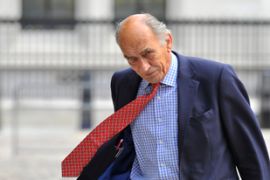UK army ‘at breaking point’ in 2006
Britain’s former military chief says fighting in Iraq and Afghanistan stretched forces.

A year before the March 2003 invasion of Iraq, the British army had no desire to take part, Dannatt said, but the US would have been disappointed if its request for military help had been denied.
“The thinking that was developing was: if we are going to get involved, and we can probably get involved, let’s keep our involvements as small as we possibly can,” Dannatt said.
Flawed planning
Giving evidence later in the day, General Mike Jackson, the head of the army from 2003-2006, said pre-war planning had been flawed as the Pentagon had simply hoped that a quick strike would bring around a simple change of direction in Iraq.
|
“I certainly personally did not have confidence that Washington had thought this through” General Mike Jackson, |
“There was no plan B,” he said. “I certainly personally did not have confidence that Washington had thought this through.”
The former military chiefs also addressed concerns about the lack of basic equipment such as desert clothing.
“I think it was a deficiency in leadership and energy in solving this problem,” Dannatt said about the procurement process.
He said that that there had been squabbles at the ministry of defence over which projects had to be cut to find money for new equipment.
When new equipment did arrive, troops were often unable to train with it until they were already in Iraq or just before they were deployed.
“That’s not ideal, verging on the not acceptable,” Dannatt said.
‘Creaking’ helicopter fleet
In declassified documents, Jackson said that Britain’s helicopter fleet was “creaking” by 2005.
“The overall picture is one of an SH [support helicopter] force ill-matched to support current operations. If our SH capability is inadequate, our AT [air transport] fleet is worse,” he wrote.
Britain’s Labour government, which lost power after election in May, has repeatedly denied accusations that it had failed to properly fund and equip the armed forces.
Earlier this year. Gordon Brown, the former prime minister, told the inquiry that he had always provided the military with the money to meet its wartime requests, either as premier or as finance minister for 10 years from 1997.
Brown set up the Iraq war inquiry last year to learn lessons from the war.
Chaired by John Chilcot, a former civil servant, the inquiry is expected to conclude at the end of this year.